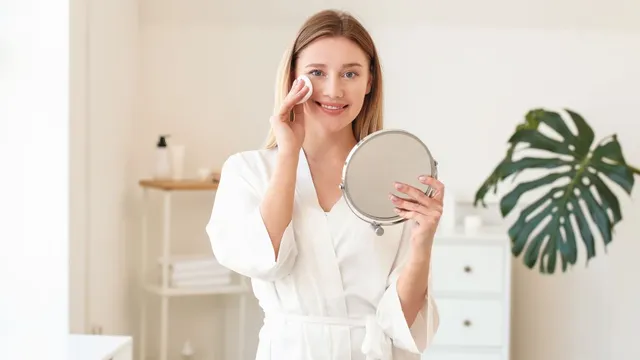- By Priyanka Munshi
- Fri, 13 Sep 2024 12:07 PM (IST)
- Source:JND
After spending hours throughout the day where your skin faces pollution, dirt, and oil that mix with the makeup on your face, coming home and following a proper skincare routine can feel hectic. However, did you know that sleeping with makeup on can actually make your skin look dull and lead to fine wrinkles and breakouts? Yes, you heard that right. Removing your makeup is one of the most important steps you can take before going to bed for healthier, better-looking skin.
Sleeping with makeup on can interfere with your skin's natural repair process, causing issues like premature aging, dryness, and irritation. Taking a little time each night to clean your face properly and use the right products can make your skin healthier and clearer. Here are some reasons why you should clean your face every day before going to bed.
Reasons Why You Must Clean Your Fcae Before Slepping
Breakouts
Wearing makeup all day and being exposed to dirt and pollution can make your skin look dull. It is important to clean your face before going to bed, as makeup can clog pores and cause breakouts.
Also Read: 5 Healthy Reasons Why You Must Eat One Banana Everyday In Your Breakfast
Aging
Sleeping with makeup on can cause premature aging due to unnecessary free radical exposure. During the day, your skin is exposed to free radicals and other oxidative stressors, which can break down collagen and lead to fine lines and wrinkles.
Dry Skin
Sleeping with makeup can make your skin dry by creating a barrier that prevents moisture from penetrating the skin.
-1726209404251.jpg)
Sleeping with makeup on can lead to dull skin, fine wrinkles, and breakouts. (Image Credit: Canva)
Dull Skin
Sleeping with makeup on can disrupt your skin's natural renewal process, leading to dull, itchy, and dry skin.
Also Read: Can Eating An Apple A Day Help You Lose Weight? 5 Benefits Of Eating This Fruit Daily
Negative Impact On Eyes
Sleeping with makeup on, especially around the eyes, can cause irritation, itching, and an increased risk of infection. It can also potentially lead to eyelid cysts and redness if done regularly.

